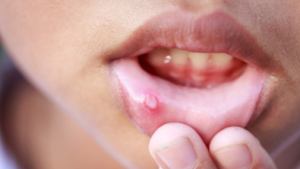Call Us Now :
+919838778776
Mailing Address :
ityagi@rediffmail.com
Monday To Friday :
10.00 am to 01.30pm
+919838778776
ityagi@rediffmail.com
10.00 am to 01.30pm
Aphthous ulcer are small ulcer craters in the lining of the mouth that are painful and sensitive. These are so common that about 20% of the population (one out of five people) have had these sores at any one time.
Women are slightly more likely than men to have recurrent canker sores. It can occur at any age, but it is more commonly seen in teenagers. Genetic studies show that susceptibility to recurrent outbreaks of the sores is inherited in some patients. This partially explains why family members often share the condition.

The cause of canker sores is not well understood. More than one cause is likely, even for individual patients. Canker sores do not appear to be caused by viruses or bacteria, although an allergy to a type of bacterium commonly found in the mouth may trigger them in some people. The sores may be an allergic reaction to certain foods. In addition, there is research suggesting that canker sores may be caused by a faulty immune system that uses the body’s defenses against disease to attack and destroy the normal cells of the mouth or tongue.
British studies show that in about 20 percent of patients, canker sores are due partly to nutritional deficiencies, especially lack of vitamin B12, folic acid, and iron. Similar studies performed in the United States, however, have not confirmed this finding. In a small percentage of patients, canker sores occur along with gastrointestinal problems, such as an inability to digest certain cereals. In these patients, canker sores appear to be part of a generalized disorder of the digestive tract. Vitamin C deficiency has also been associated with canker sores.
Emotional stress and local trauma or injury to the mouth, such as sharp metal braces, brushing with hard toothbrushes, and hot foods can lead to canker sores. Smoking and dentures can also contribute to the problem. Some studies have shown a connection with toothpaste containing sodium lauryl sulfate in some individuals, although, other studies have not found any connection.
Other possible causes of canker sores include illnesses in which the immune system causes swelling or inflammation of the body tissues (autoimmune disorders). Examples of autoimmune disorders are systemic lupus erythematosus, Crohn’s disease, and Behcet’s disease.
Female sex hormones also apparently play a role in causing these sores. Many women experience bouts of the sores only during certain phases of their menstrual cycles. Additionally, most women experience improvement or remission of their sores during pregnancy.
These sores are usually found on the movable parts of the mouth, such as the tongue or the inside lining of the lips and cheeks, and at the base of the gums. The Mouth ulcer begin as small oval or round reddish swellings that usually burst within a day. The ruptured sores are covered by a thin white or yellow membrane and edged by a red halo. Generally, the sores heal within two weeks without scarring. Fever is rare, and the sores are rarely associated with other diseases. Usually, a person has only one or a few sores at a time.
Most people experience their first bout with sores between the ages of 10 and 20. Children as young as 2 years old, however, can develop the condition. The frequency of canker sore recurrences varies considerably. Some people have only one or two episodes a year, while others may have a continuous series of these sores.
Aphthous ulcers typically resolve without any specific treatment. But measures can be taken to alleviate the pain and discomfort and to hasten the course. Therapies include topical medications (applied directly on), mouthwashes, and oral medications.
